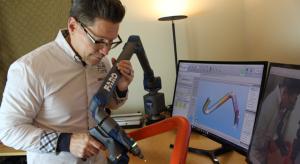All Features

Lee McIntyre
The life choices that had led me to be sitting in a booth underneath a banner that read “Ask a Philosopher” at the entrance to the New York subway at 57th and 8th were perhaps random but inevitable.
I’d been a “public philosopher” for 15 years, so I readily agreed to join my colleague Ian Olasov…

Donald J. Wheeler
Managers the world over want to know if things are “in control.” This usually is taken to mean that the process is producing 100-percent conforming product, and to this end an emphasis is placed upon having a good capability or performance index. But a good index by itself does not tell the whole…

NIST
Engineers at the National Institute of Standards and Technology (NIST) needed a way to secure smart manufacturing systems using the digital thread, so they turned to the new kid on the block... blockchain, that is.
According to a new NIST report, the security system better known for underpinning…

Rachel Plotnik
All day every day, throughout the United States, people push buttons—on coffee makers, TV remote controls, and even social media posts they “like.” For more than seven years, I’ve been trying to understand why, looking into where buttons came from, why people love them—and why people loathe them.…

Jeffrey Phillips
I went to a meeting about innovation recently with a former client, and a discussion about digital transformation broke out. It was both interesting and strange.
Most corporations are struggling to comprehend the changes in front of them, but at the same time are so fixated on short-term thinking…

Knowledge at Wharton
In the 1999 film Office Space, a dark comedy about the mundane conventionality of work, disgruntled software engineer Peter Gibbons tells his new love interest, Joanna, that he hates his job and doesn’t want to go anymore.
When Joanna, played by actress Jennifer Aniston, asks Peter whether he is…

David L. Chandler
Applying just a bit of strain to a piece of semiconductor or other crystalline material can deform the orderly arrangement of atoms in its structure enough to cause dramatic changes in its properties, such as the way it conducts electricity, transmits light, or conducts heat.
Now, a team of…

Zach Y. Brown
Imagine there was a store where there were no prices on items, and you never knew what you’d pay until you’d picked out your purchases and were leaving the shop. You might be skeptical that the store would have any incentive to offer reasonable prices.
This exact situation has become the norm in U…

William A. Levinson
The Pareto principle calls for focus on the vital few rather than the trivial many. While none of ISO 9001’s clauses are trivial—a nonconformance for any of them requires corrective action—ISO 9001 users can avoid most nonconformances by focusing on the clauses that are the most frequent trouble…

Annette Franz
In the past, I’ve written about some of the myths of journey mapping. One of those myths is: Without a digital mapping platform, I can’t even begin to map. Let me explain my position.
You probably know by now that I’m an advocate of digitizing your maps, for a variety of reasons, not the least of…

Jim Benson
A few years ago, I received a call from a very frustrated vice president of development in the Midwest. He sent his staff to get trained in Scrum. He thought he was sending his team off to learn how to develop software. Instead, they came back scrumbroken.
The team spun in circles arguing about…

Davis Balestracci
During recent visits to Twitter and LinkedIn, I’ve become increasingly shocked by the devolution of the posts to vacuous nonsense. I felt a Network moment of, “I’m mad as hell, and I’m not going to take this anymore!”
Is your organization getting to the point where executive reaction to what’s…

Guangnan Meng
Electrodes are essential components of modern lithium-ion batteries, which are used to power mobile electronic devices, electric vehicles, and many other products. The battery’s surface structure and engineering are directly related to its performance, life expectancy, and safety.
The batteries…

Ryan E. Day
In the manufacturing universe, metal tube fabrication is a world of its own. That being said, the requirements for developing a new world-standard solution for tube bending are common to all manufacturing—be faster, more accurate, and more economical.
With customers like Delta Air Lines, British…

Jesse Lyn Stoner
I had the pleasure of interviewing Whitney Johnson, author of the book, Build an A Team: Play to Their Strengths and Lead Them Up the Learning Curve (Harvard Business Review Press, 2018). Whitney has done ground-breaking work in the arena of personal disruption—applying these concepts to…

Gwendolyn Galsworth
Most people have a notion about the visual workplace that is much too small for themselves and their companies. They think of it as a series of point solutions that are helpful, even clever. Yet they should expect more—because they need more.
In fact, visuality is a language—an imbedded system of…

Stephen McCarthy
I am thrilled to introduce Quality Digest’s special report, “Unlocking the Future of Life Sciences.” This series explores the last several decades of quality management within the life sciences industry. It begins with the genesis of early regulations, shows us how that led to the current state of…

Mike Richman
Great quality is pretty much the same everywhere, but the cost of poor quality is not equivalent from industry to industry. For example, it’s conceivable (but I hope not probable) that this article may turn out to be a real bomb, or worse, a complete snoozer. What’s the cost of that poor quality?…

Quality Digest
Within the life science industry, federal and industry regulations have prompted the need for compliance, and that trend has only increased in magnitude and complexity. Along with that has come technological solutions to enable both compliance and efficiency, without which life science…

Dirk Dusharme @ Quality Digest
As the United States struggles with rising healthcare costs, reducing the amount of money pharmaceutical companies spend dealing with regulation, while at the same time meeting drug safety requirements, would seem to be competing interests.
The goal of any honest pharmaceutical company is to make…

Laurel Thoennes @ QD
Compliance to U.S. Food and Drug Administration (FDA) regulations has come a long way in the past 30 years. Here are the main changes. Have they affected your business?
1988: Food and Drug Administration ActOfficially establishes the FDA as an agency of the Department of Health and Human Services…

Taran March @ Quality Digest
It’s been a year and a month since Stephen McCarthy switched C suites, moving from Johnson & Johnson, where he served as vice president of quality system shared services, to Sparta Systems, where he’s now vice president of digital innovation. His focus has switched as well.
At J&J, he…

Graham Freeman
Many industries have no clear boundary between safety and quality culture. In fact, they are often closely integrated. Quality failures and nonconformances that require rework have been correlated with increased accidents and recordable injury rates in manufacturing organizations. These injuries…

Scott A. Hindle
‘Process Capability: What It Is and How It Helps,” parts one, two, three, and four, discussed Alan’s development in the field of process capability1 He’d learned about the mistakes that can be made and how to avoid them in practice to become better at his job. Alan had since passed on his learning…

Steve McKee
Your business does not have a brand; your brand has a business. That may sound odd, backward, even heretical, but it’s true.
Consider the smartphone on which you may be reading this. When it was fresh out of the box and had gigabytes of memory to spare, it weighed roughly 6 ounces, depending on…